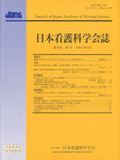Japanese
English
- 販売していません
- Abstract 文献概要
- 参考文献 Reference
要旨
【目的】 地域で生活する健常高齢者の介護予防行動に影響を及ぼす要因とその関係を明らかにした.
【方法】 改訂Health Promotion Modelの枠組みに基づき,健常高齢者148名を対象に質問紙調査を実施した.因子分析により得点化した介護予防行動(17項目,α=0.83)に影響を及ぼす要因のパスモデルを作成した.
【結果】 対象者の平均年齢は70.86±6.36歳だった.パスモデル(χ2=26.57, p=.28, AGFI=.93, RMSEA=.03)から,介護予防行動に直接的に影響していたのは自己効力感(β=.60, p<.001)と実行負担の知覚(β=-.14, p<.05)であり,間接的に影響していたのは,介護予防の知識,年齢,主観的幸福感,通院や処方薬の服用,主観的幸福感,Health Locus of Control,在宅介護の経験であった.
【結論】 健常高齢者が主体的に介護予防行動を実行するためには,自己効力感を高め,実行負担の知覚を軽減させる支援が必要だと考えられた.
Abstract
Purpose: The purpose of this study was to explore factors influencing behaviors for preventative self-care (BPSC) among healthy community-dwelling elders.
Methods: The subjects were healthy community-dwelling elders aged 60--89 years. The study design was based on the Pender's Revised Health Promotion Model. BPSC was defined as the health behaviors practiced by elderly subjects in their daily lives towards the aim of living independently in their own homes and communities as long as possible. The self-administered questionnaire included demographic information such as age and sex and items regarding:instrumental activities of daily living (IADL), health locus of control (HLC), subjective well-being, knowledge of preventative self-care, the self-efficacy scale for health promotion (self-efficacy), BPSC and perceived barriers to BPSC. Data analysis was conducted using path analysis.
Results: A total of 148 subjects gave sufficient data for inclusion in data analysis. The mean age was 70.86±6.36 years old. The final model showed a goodness of fit (χ2=26.57, p=.28, GFI=.96, AGFI=.93, and RMSEA=.03). Path analysis indicated that self-efficacy (β=.60, p<.001) and perceived barriers to BPSC (β=-.14, p<.05) directly influenced BPSC. Furthermore, knowledge of preventative self-care (β=.32, p<.001), age (β=.28, p<.001), subjective well-being (β=.19, p<.01) and regular hospital visits (β=.17, p<.05) affected BPSC indirectly through self-efficacy. HLC (β=-.22, p<.01), subjective well-being (β=-.19, p<.01) and availability of family care-giving (β=-.15, p<.05) also affected BPSC indirectly through perceived barriers to BPSC.
Conclusion: These results suggest that it is necessary to provide support to enhance elders' self-efficacy and to reduce the perceived barriers to BPSC, in order to encourage BPSC.
Copyright © 2009, Japan Academy of Nursing Science. All rights reserved.


